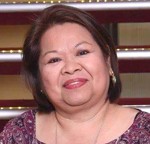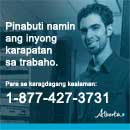- News Front Page
- Uncategorized
- Headline News
- Filipino Calgarian
- Business
- Pinoy Stories
- Community News
- Publisher's Note
- The Main Ingredient
- Views and Opinions
- Maikling Kwento
- Alberta News
- OFW – Month
- Travel News
- Health and Lifestyle
- Pinoy Toons
- Pinoy Spirit
- Entertainment
- The Philippine Lawyer
- Horoscope
- Greetings
- About Us
- Greetings From the Prime Minister
- Greetings from the President of the Philippines
- Greetings from the Premier of Alberta
- Greetings from the Mayor of Calgary
- Advertise With Us
- Disclaimer
- Subscription
Publisher's Note
- Publisher’s Note
 It was 22 years ago when I arrived in Canada and chose Calgary, Alberta to be my home. Leaving my family and friends behind, it was a new adventure for me to be in a new country without knowing anyone. That was the time I looked for a Filipino community paper and never found any, [...]
It was 22 years ago when I arrived in Canada and chose Calgary, Alberta to be my home. Leaving my family and friends behind, it was a new adventure for me to be in a new country without knowing anyone. That was the time I looked for a Filipino community paper and never found any, [...]
Visitors to Pinoytimes
Page added on March 28, 2014
One Filipino Family’s Homeschool Journey : The Beginning of the Adventure
Part 1 of Homeschooling in Canada Series
by Jane Guinto
“You will what?!”
“What about socialization?”
“Your kids will never learn how to assert themselves.”
Oh, the adventures we experience while homeschooling! Such joy!
Let me tell you briefly how it all began and why.
Wake up at 5:30 am, get dressed, eat breakfast, brush teeth, braid hair, pack “merienda,” grab school bag, rush through the door and into the car. Whoosh! This was our typical morning school day. My daughter, Hannah, and I need to leave the house by 6:30 am to beat the rush hour. We had to be in school by 7 am to make it to the flag ceremony. I usually brought along “yaya” (nanny) with me in the car so Hannah could eat in between sleep and travel. This happened five times a week. She was six, in grade two, in a “big school.” In the following months of doing this, this should have been a routine already. But it did not happen that way. Hannah would not eat breakfast, had frequent stomachaches and her shoulder blades were very prominent. What good Filipino mother would send her child to school without food in his/her stomach? She clearly showed signs of stress. While I took her to school everyday, my son who was in a nearby preschool, was with his “yaya” often, attaching to her like a mother. I did not like that at all. These situations, among others, led my husband and I into thinking (and praying) of other ways of educating our children. Unlike today, there was little information on homeschooling in the Philippines on the internet. But I was able to connect to a mom in our Bible study group who gave me my first homeschool class 101. I also met one of the “pioneer” homeschool moms who immensely encouraged me and my family to jump into this wonderful adventure called homeschooling.
Of course, the moment my family knew about our decision, they thought we were crazy and were very much concerned with “socialization.” You have to believe me that socialization issues are myth to homeschooling. If ever a homeschooled child is shy or quiet, it is his/her personality and there is nothing wrong with that. Just as there are shy public or private school kids, there would be reserved homeschooled children as well. I have met a lot of bashful adults in my life and they were never homeschooled. But as it usually happens, homeschooled children are overly socialized, especially during the first years. There would be swimming, soccer, wall climbing, ice skating, math, art, music classes, choir practices all happening at the same time month after month. While we lived in Manila, we have met homeschooled children with different personalities – but most of them polite, spoke fluent English, would respond appropriately and respectfully when spoken to or when reprimanded by authority. They adjust to any social groups from churches, playgroups, camps, classes to parties. Most are deep in their Christian faiths – whether Catholic, Evangelical, Seventh-Day Adventist, and others. We regularly met with American missionaries’ kids and played with multi-cultural (ex-pats) families. We went to see the president in Malacañang twice, was featured in a newspaper and on television. I also remember attending “futsal” (indoor soccer) classes where a team would consist of children from 6- to 14-year olds with one parent. There was no age, gender or grade level segregation. Socialization was both vertical and horizontal. Now that is real life, if you ask me. Debunk the socialization myth.
A degree in education, you say? No, my husband and I do not have it. And that is why we put our children to classes we do not feel qualified to teach. But hey, my eldest daughter and son were in grades 3 and 1 respectively when we started. How hard could that be? Parents of private- and public-schooled kids tutor their kids at home and most of them do not have a bachelor’s degree in education. Hannah was able to read the basic C-V-C words three months before she turned 3 years old! All my kids learned how to read at home. I just read to them all the time. We loved the “snuggle” factor that came along with read-alouds. We played, sang, learned, did arts and experiments, went to special classes together. When it came to a point when the subjects got hard, my husband and I just have to learn them with our children. I do remember asking some of the moms and educators about certain things. There was the internet, too. Above all, I tell my children that they have to own their education and taught them to be lifelong learners.
When health and relationship were the first reasons why we chose homeschooling, they are no longer the primary reasons why we continue to do so today. We homeschool because we want to pass on our Christian faith and traditional values to our children, especially here in Canada. We strive to be purposeful on that – whatever the challenges maybe. Personally, ss homeschoolers, we do not see ourselves more superior than public or private schools. Homeschooling just happens to be our version of “lifestyle design” as Timothy Ferriss, author of “The 4-Hour Workweek,” would have suggested. Robert Kiyosaki, in his book, “Rich Kid, Smart Kid,” affirms homeschooling parents on their effort to raise financially smart kids. Homeschooling works, if the family is committed to it, by the grace of God.
There is so much to write about homeschooling to the Filipino-Canadian community. It is never mentioned in the PDOS and Canadian Orientation Abroad (COA) seminars and printed materials for new immigrants. In the three years we have lived here in Calgary, we only met three Filipino families who homeschool. But whether you are a proponent or an opponent, this is a family’s choice. We have to respect them. Homeschooling is legal in Canada but different provinces have different regulations and funding. It is very well supported in Alberta. Check out Calgary’s Child and you would discover a plethora of homeschool support and classes all over the city, all year round.
In my succeeding articles, I will continue to share our homeschool experiences in Calgary, its advantages and disadvantages, how you can homeschool your children here, the general funding each child can receive and more. In the last part of this series, I will touch on mixing homeschool and operating a homebased business.
Connect with me on Facebook and Twitter!
Jane Guinto
Homeschool mom of Hannah, Luis and Sarah
Wife to Felix, a photographer
Graphic Designer
Mom-preneur
RELATED STORIES
LATEST HEADLINES
- ISKWELAHANG PILIPINO (IP) RONDALLA OF BOSTON WINS THE HEARTS OF CALGARIANS
- Pinay doctor joins Medicus Family Clinic and Pharmacy
- Multicultural Ethnic Media round table with Minister of Finance Joe Ceci together with Minister of Social Services Irfan Sabir
- Trans Mountain Pipeline keeps Canada working
- Facilitating travel to Canada while keeping Canadians safe
COMMUNITY NEWS
 A new way forward for some immigration application processing times
A new way forward for some immigration application processing times Calgary Stampede 2018 Poster
Calgary Stampede 2018 Poster Alberta celebrates first Philippine Heritage Month
Alberta celebrates first Philippine Heritage Month UPAAA Welcomes New Philippine Consul General
UPAAA Welcomes New Philippine Consul GeneralPINOY STORIES
 Duterte signs National ID System Act
Duterte signs National ID System Act- Holy Week practices in the Philippines
PINOY SPIRIT
HAVE YOUR SAY
Lorem ipsum dolor sit amet, consectetur adipiscing elit, dolor sit ipsum.PROMOTIONAL BLOCK
Lorem ipsum dolor sit amet, consectetur adipiscing elit, dolor sit ipsum.TRAVEL NEWS
PINOY TOONS
Tags
Archives


















